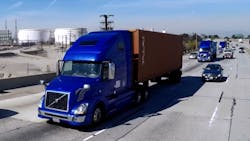Volvo Trucks tests on-highway three-truck platooning
Volvo Trucks and Partners for Advanced Transportation Technology (PATH) at the University of California, Berkeley recently completed a successful demonstration of partially automated truck platooning, made possible by Cooperative Adaptive Cruise Control, or CACC, technology.
Three Volvo VNL 670 model tractors hauled cargo containers at California's Los Angeles Port complex and along Interstate 110, highlighting for public officials and other stakeholders the technology’s potential for improving highway safety, reducing greenhouse gas emissions, and increasing the capacity of transportation systems.
"Truck platooning can benefit freight companies and professional drivers alike through safer, more fuel-efficient operations," said Magnus Koeck, vice president of marketing and brand management at Volvo Trucks. "Vehicle-to-vehicle communication is pivotal for platooning systems; it helps reduce the reaction time for braking and enables vehicles to follow closer. Reducing the traveling distance between vehicles not only reduces the aerodynamic drag, but also allows for greater highway utilization, thereby helping to alleviate traffic congestion."
As described in a video showing the technology, "drivers [of the platooning trucks] continue to control the steering, and remain vigilant for any hazards in the driving environment." In what Volvo describes as "simulated real world" conditions, three Volvo VNL tractors traveled at 55 mph and were 50 ft. apart, "a closer distance than usual for on-highway tractors." Forward-looking sensors and vehicle-to-vehicle communication helps the trucks maintain speed and spacing without driver intervention. Staged and unplanned vehicle cut-ins showed how the technology handles common traffic changes.
CACC technology is an enhancement to the current Adaptive Cruise Control (ACC) technology that enables closer and more accurate control of the gap between trucks with increased safety. The advanced technology that makes platooning possible is meant to serve as an aid — not a replacement — for skilled professional truck drivers, Volvo Trucks notes.
Benefits of platooning through CACC include faster responses to hard braking while maintaining safety, superior longitudinal control while following in a lane, reduced emissions, and improved traffic flow, according to Volvo Trucks.
The CACC technology being developed in conjunction with PATH has been sponsored by the U.S. Department of Transportation/ Federal Highway Administration Advanced Research Program and Caltrans. Other project partners include Cambridge Systematics, Inc., the Los Angeles County Metropolitan Transportation Authority, and Gateway Cities Council of Governments.
Volvo Trucks states that platooning "presents the best near-term opportunity for leveraging any level of autonomous technology for on-highway operations, where a skilled professional driver remains vitally important." The company notes it has demonstrated a fully autonomous truck working in a mining operation. Confined environments or jobs humans cannot perform remain the best and most feasible applications for fully autonomous vehicles.
Watch more on the technology in this video below:
About the Author
Fleet Owner Staff
Our Editorial Team
Kevin Jones, Editorial Director, Commercial Vehicle Group
Cristina Commendatore, Executive Editor
Scott Achelpohl, Managing Editor
Josh Fisher, Senior Editor
Catharine Conway, Digital Editor
Eric Van Egeren, Art Director
